Episode 1, emergency food distribution and the role of the cameras
March 19, 2006
- This entry refers to food distribution as discussed in yesterday’s entry about the World Food Programme’s computer game, Food Force.
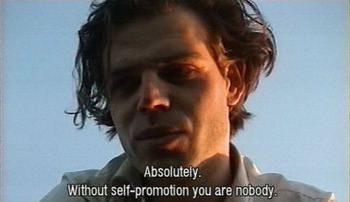
video still from Episode 1, © Renzo Martens
In January 2004, Dutch artist Renzo Martens produced his forty-four minute art film, Episode 1, a documentation of an extensive art performance. Martens travelled to the hottest hot spot war that he could find at the time of making the film (Chechnya, 2002), and in this ’setting’ he pointed the camera, not at the war’s victims and/or perpetrators like most (news) cameras do, but back upon himself. In Episode 1, Martens asks his Chechen and Russian Federation subjects, ‘What do you think about me?’
Enough about you, let’s talk about what you think about me.
Martens subjects are the normal cast of characters in every war; heavily armed soldiers on border patrol, civilians lining up for food, civilians trying to get on with it, civilians suffering before their destroyed homes and lives, refugees, but also all manner of NGO employees with their food programmes and journalists with their stories. Within minutes we understand that this is not simply a film about war, but a film about the role of the camera in war, about ethics, the dehumanising effect of pointing the camera and about what is so humanising about turning the camera back around at one’s self.
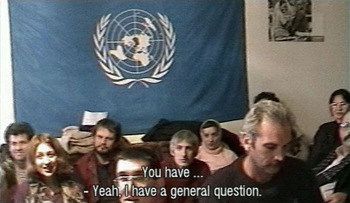
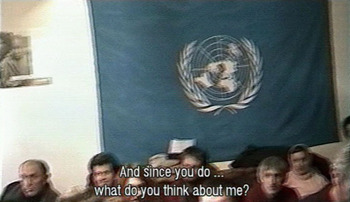
video stills from Episode 1, © Renzo Martens
In the tense environment of a Chechen UN press conference, in territories under fire, the conference moderator asks a group of journalists, NGO employees and UN workers, ‘Does anyone have any questions?’ Martens pipes up, ‘Yes, I have a question!’ ‘What do you think about me?’ Peals of laughter, no one can believe their ears. Ultimatey Martens’ question is ignored and the journalists and NGO employees disband to their SUV convoys, rushing off to yet another ‘opening’ of a milk powder storage facility. Martens interviews the director of the operation, and together they quickly establish the fact that where there are cameras, there can be food relief. No cameras, no aid. In light of this, how could the World Food Programme build its computer game Food Force without even one single PR tier?
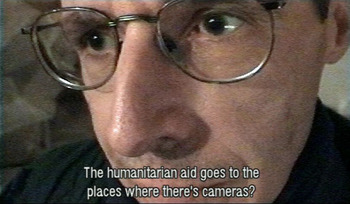
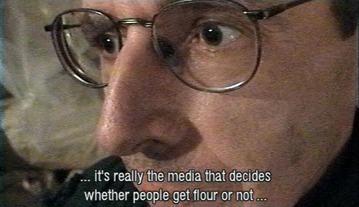
video still from Episode 1, © Renzo Martens
Episode 1 takes us through many such media-laden scenarios. In an open market destroyed no more than thirty minutes ago by Russian Federation soldiers with tanks and heavy artillery, a woman recounts how she and the other market women formed a human shield to halt the execution of a group of Chechen boys. Speaking to the camera, in an oddly well-rehearsed role of who stands where and who says what to the camera, the woman is still shaking from the experience. The scene ends with Martens staring shamefaced at the ground, unable to gather enough gumption to ask her what she thinks of him.
At a food distribution centre, Martens addresses a group of women lined up to receive rations of oil and flour. ‘I just want to ask you what you think of me!’ and this time there is an answer. The grim situation of lining up to receive basic foodstuffs, fades in the face of humanising laughter and warm sparkling eyes, women just being women. For a moment the food queue has all but disappeared. ‘Boy, I think you’re handsome, with your blue eyes!’ ‘What’s your theme?’ ‘Are you a journalist?’ ‘No, he’s an artist.’ ‘I think he’s a journalist.’
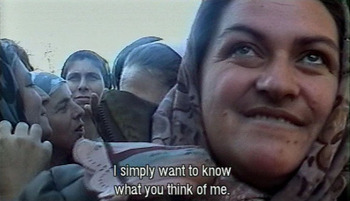
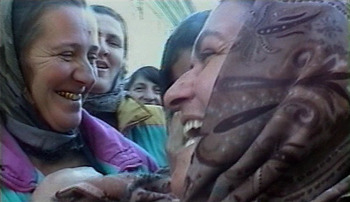
video stills from Episode 1, © Renzo Martens
Ultimately Martens ‘act’ of showing up with his camera and popping the question brings humanity to every situation that he creates. When he meets a young woman in a refugee camp (who bears an uncanny resemblance to his true love back in Belgium), his question changes, ‘How should a man let a woman know that he loves her?’ the woman’s answer, delivered with beaming smile and sparkling eyes, dissolves the miserable tent landscape and suddenly it’s just two people (and their translators) talking about love and life.
Of course Martens created this film for an art context, and the film articulately addresses contemporary art issues. Quite possibly Martens would be appalled that I consider his film to be ‘useful’, not just for artists and an art public, but as a tool to talk about the causes of war, hunger and the politics of emergency food distribution. And the question that Martens dares to ask amidst flying bullets, UN press conferences, annoyed Russian soldiers, women in food queues and refugees living in tent camps, the initial struggle that it initiates in the interviewee and in me, the audience, as I am simultaneously embarrassed by this question, but know that it is a question that can air-lift all of us actors out of the immediate and into a larger, more important discussion. Complexity is not complicated. Episode 1 brings us to the next tier, where a complex situation can be discussed with the nuance it deserves.
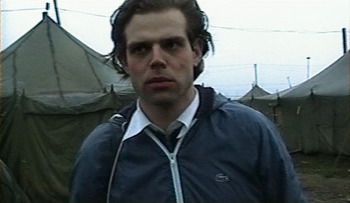
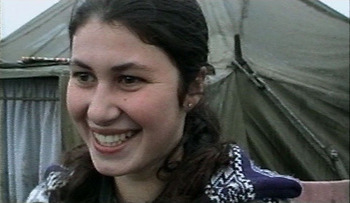
video still from Episode 1, © Renzo Martens
technorati tags: food-related film, Episode 1, Renzo Martens, Chechnya, cinema, emergency food distribution, Food Force
debra at 11:17 | | post to del.icio.us
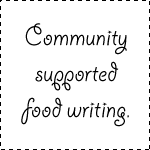
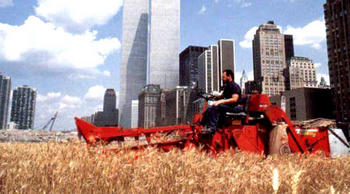
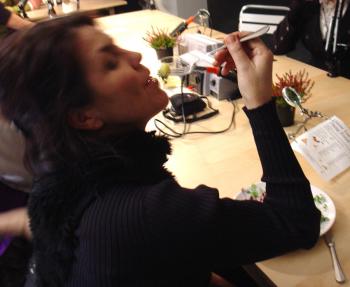
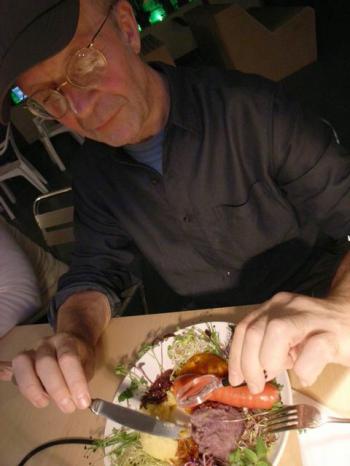

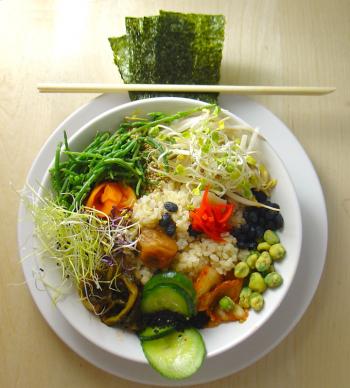
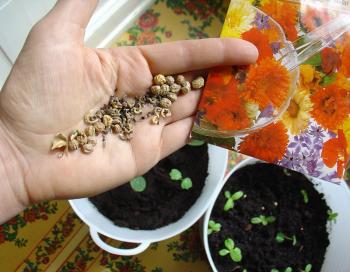
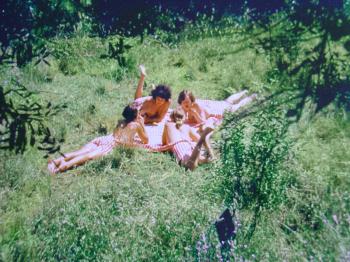
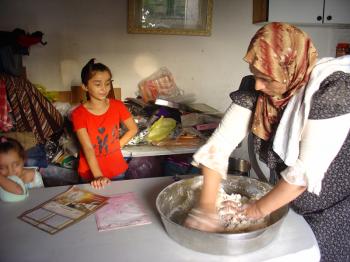
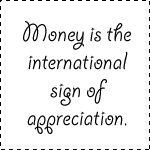









Thank you for sharing this with us, Debra. A fascinating subject.
Comment by sam — March 19, 2006 @ 19:18
It is and it’s my pleasure.
YAY! Sam’s BACK!!!!!!!!!!!
Comment by debra — March 19, 2006 @ 21:20
Hey there, this was a really interesting post. Nice to find your site.
Comment by Di — March 20, 2006 @ 15:53
i was discussed about this so called ¨artist¨ and his documentary, the whole documentary had no meaning or level of awarness, besides from the already known fact about the situation these people live their lives day to day, renzo should not be so selfcentred, and diskise this under the fact that he is an artist, the questions you asked had nothing to do with, yournalism and if you say this is art, then it must be called renzo art.
Comment by Lizita.lizita@hotmail.com — November 20, 2008 @ 18:27